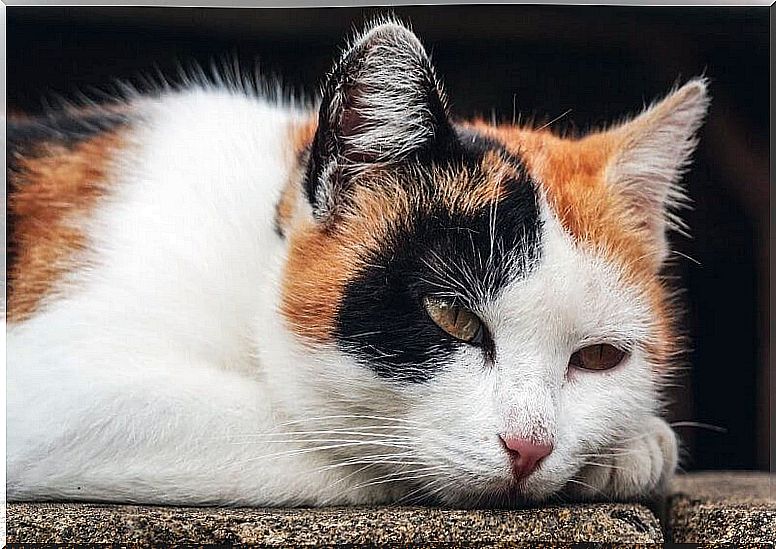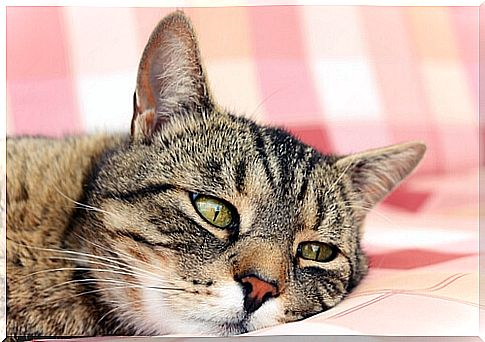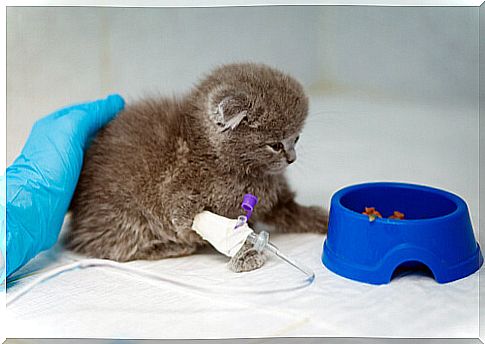Anemia In Cats: How To Detect, Understand And Treat It

Surely you have ever heard of anemia. Both humans and animals can suffer from it. Anemia in cats is a decrease in the number of erythrocytes or red blood cells in the blood.
These are the cells in charge of transporting oxygen to the tissues. In anemia, the amount of hemoglobin, a pigment in erythrocytes capable of capturing oxygen and carbon dioxide molecules, is also reduced.
The causes of anemia in cats are varied and each one has a specific treatment associated with it. In My Animals we will tell you how to detect and treat anemia in cats. It should always be a veterinarian who confirms the diagnosis and decides the best treatment.
How do we detect anemia?
In general, the clinical symptoms of anemia are tiredness, depression, decreased appetite, and pale mucous membranes. There may also be weight loss and some cats show respiratory symptoms, which may be associated with other pathologies. As we will see below, the cause will determine the evolution of the affected cat.
The test that will confirm the anemia to the veterinarian will be the blood test. Specifically, the blood count. It shows the number of cells – red blood cells, white blood cells and platelets – present in the blood and their proportion, as well as the amount of hemoglobin.
If the erythrocyte values are below the minimum threshold established for cats, we will find a case of anemia. However, the blood count will only confirm the anemia situation, but not its cause.

Causes of anemia in cats
Depending on the cause or the response of the body, there are different ways to classify the types of anemia in cats. For example, whether or not the bone marrow can reproduce new red blood cells, we classify anemia as:
- Regenerative anemia : the animal loses more red blood cells than the bone marrow is capable of generating.
- Non-regenerative anemia : The bone marrow has stopped producing red blood cells. New ones are not regenerated. This type of anemia is more serious and has a worse prognosis. It is usually associated with kidney, endocrine and immune diseases. Bacteria of the genus Ehrlichia or Hemobartonella can also develop anemia.
There are more classifications, but this is the most common.
Treatment of anemia in cats
Treatment will depend on the underlying cause that your vet diagnoses. However, if we are facing a severe case of anemia, our cat may need a blood transfusion to stabilize its condition. The transfusion provides an immediate supply of red blood cells. As in humans, the donor’s blood must be compatible with the patient.

If the anemia is caused by a lack of nutrients, it will be enough to improve the diet. Our veterinarian will recommend the most appropriate one in each case.
Can we prevent anemia?
If our pet is developing a disease that affects the production of erythrocytes, and we do not observe symptoms, it is difficult to prevent it. For this reason, periodic check-ups at the vet are important. On the other hand, we can control certain factors that keep our animal’s health in good condition:
- Provides a healthy, balanced and complete diet. Supermarket feed is not recommended. It is best to buy them in a specialized store. Check the composition of the feed to see if it is suitable.
- Deworm externally and internally your cat every month, to prevent external parasites. And every three months for internal parasites. It is very important that antiparasitics are specific for cats. Antiparasitics for dogs contain substances that are highly toxic to felines.
- Vaccinate your cat against infectious diseases. Leukemia and feline immunodeficiency can be associated with anemia in cats; for both diseases there are vaccines. If our cat is not vaccinated, we must be careful when exposing it to other cats.
Now you know that anemia can hide other serious diseases. Go to the vet if you suspect his symptoms; it is very important to discover the cause. Once the vet confirms the diagnosis, he will establish a treatment. As owners. We can prevent anemia by having a correct diet, protection against parasites and control of our cat’s vaccines.








